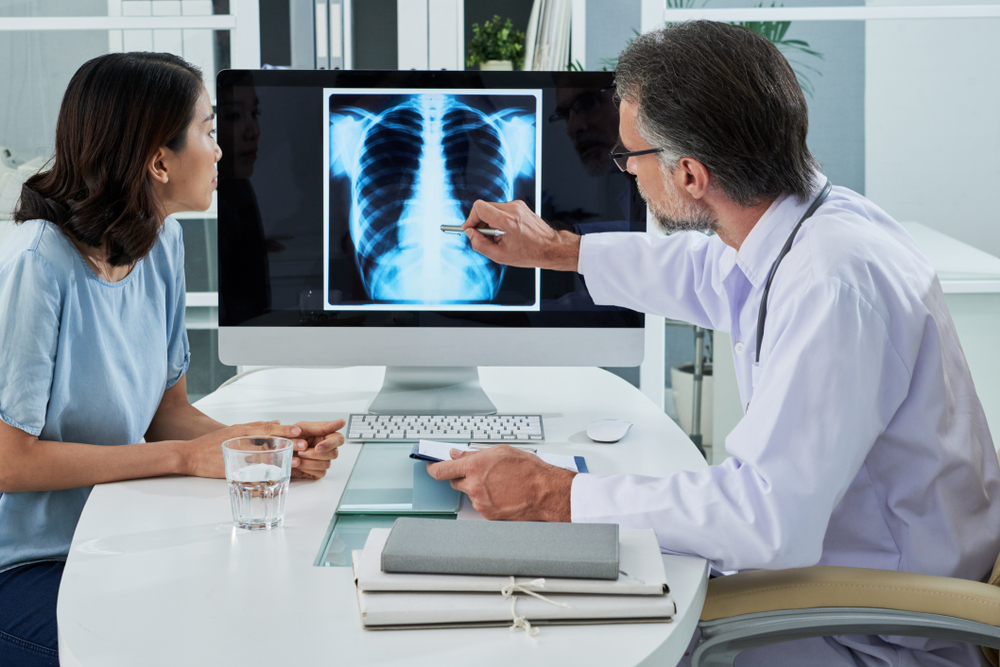Signs, Symptoms, And Treatment Options For Lung Cancer

Signs, symptoms, and treatment options for lung cancer
Shortness of breath and slight cough are some of the common lung cancer symptoms that the sufferer would experience in the early stage of the disease. These mainly depend on the part of the lung that is affected. The lung cancer symptoms tend to become more intense or severe as the disease develops. Lung cancer also shows systemic symptoms similar to other kinds of cancer like general fatigue and loss of appetite.
Common signs and symptoms of lung cancer
The disease would not show any signs at the onset; however, if a patient suffers from lung cancer, he would have certain common symptoms such as the following:
- Coughing: Lung cancer patients have the problem with a persistent cough. It refuses to go away or changes to a chronic smoker’s cough which leads to pain and persistent coughing.
- Coughing up blood: A person suffering from lung cancer would more often than now cough up blood or rust-colored spit, sputum, or phlegm. This needs immediate medical attention.
- Fatigue: It is quite common for people suffering from lung cancer to get excessively tired and feel weak very easily.
- Loss of appetite: This problem is common with most types of cancer which results in sudden weight loss.
- Recurring infections: Infections like pneumonia or bronchitis become frequent for people suffering from lung cancer.
Symptoms of lung cancer in its advanced stages
Advanced stages are characterized by cancer spreading to the other parts of the body. The major 3 signs of lung cancer in its advanced stage are that the liver, brain, and bones are affected by the cancer. As more and more places in the body continue to get affected by lung cancer, the patients experience new symptoms such as:
- Bone pain
- Jaundice
- Dizziness, headaches, weakened, or numbed limbs
- Swelling of the face, neck, and arms
- Lumps in the collarbone or neck region
Lung cancer signs and treatment
As soon as you identify any sign of lung cancer, you must immediately visit a doctor who would run some tests to confirm the suspicion. The sooner the treatment is started, the higher the chances of getting rid of the disease or at least stall its growth for a few years. Thus, it is important to maintain the shortest possible time between observing a lung cancer sign and getting treatment for the same.
Lung cancer treatment
The treatment of lung cancer depends on the presence of NSCLC or SCLC. The stage of the tumor also determines the treatment strategy. In case of NSCLC, the patient’s performance status is the key factor to establish the scope of benefit from the treatment plan. A comparison is drawn between the pre-illness and present time of how the patient is undertaking everyday activities. This functional status forms the crux of the performance status of the patient. It is to be noted that with declining performance status, the risk of complications and side-effects increases, and the possibility of benefits from the treatment declines. Moreover, in case of SCLC, a quick response to treatment happens often to overcome the issue.
Surgery
For lung cancer, surgery is the most effective of all treatments. However, only 20% of the time it can be done. It is the Stage I and Stage II NSCLC and cancer not spreading beyond the lungs that can be treated with surgery.
Radiation therapy
Radiation therapy works for both SCLC and NSCLC patients. It is a good option for those who do not want to undergo surgery or for whom surgery is not suitable.
Chemotherapy
Chemotherapy is also another option to treat both SCLC and NSCLC. Chemotherapy drugs may be administered alone or with a combination of radiation therapy or surgery. Chemotherapy is mostly recommended for SCLC because by the time the disease has been diagnosed, it has already spread widely in the body.
Targeted therapies
There are targeted therapies as well to treat lung cancer. These are generally antibodies or drugs which block the growth as well as the spread of cancer by means of interfering with the particular molecules involved in the development and progression of the tumor. These are used in patients suffering from NSCLC who have not responded to chemotherapy.
Prevention
The development of lung cancer can effectively be prevented by stopping smoking. It is also important to stop yourself from getting exposed to passive smoking as a lung cancer preventive method.
You may never know when you are affected by this lung cancer and what caused the same in your case. In order to ensure that you are not affected by the same, get yourself checked on a regular basis. It would help with the disease if you maintain a healthy lifestyle as well. If possible, try to avoid going to places which are known for their high pollution levels. Instead, give your lungs some fresh air every day. Eating food items known to prevent cancer can also be helpful.

